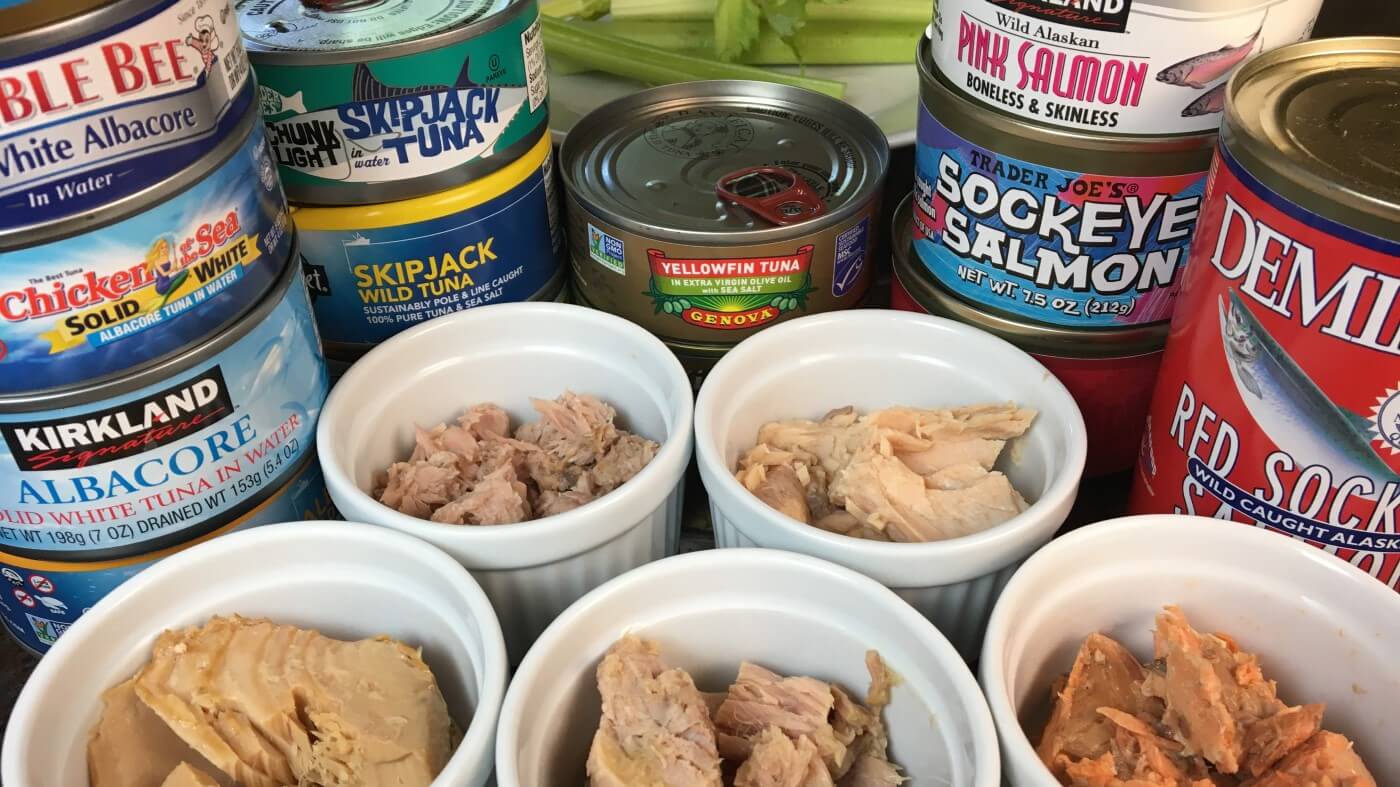Best and Worst Tuna, Salmon and Sardines? ConsumerLab Tests Reveal Amounts of Omega-3s and Toxic Heavy Metals in Canned and Packaged Fish

White Plains, New York, July 10, 2020 — Canned and packaged tuna, salmon and sardines can be an excellent source of omega-3 fatty acids, but some may also be contaminated with toxic heavy metals such as mercury and arsenic. So which products on the market provide the highest amounts of omega-3s with the least contamination?
To find out, ConsumerLab purchased and tested popular canned and packaged tuna, salmon and sardines sold in the U.S., checking each for the omega-3 fatty acids DHA, EPA and DPA, as well as omega-7 fatty acids, and for contamination with mercury, arsenic, lead, and cadmium. ConsumerLab also tested the oil in products to determine if it was fresh or rancid.
The tests showed that, based on recommended serving sizes, sardines and salmon contained much higher amounts of omega-3 fatty acids than tuna. Sardines provided about 1,600 mg to 1,800 mg of DHA and EPA per 85 gram serving, while salmon provided 400 mg to 700 mg per 56 gram serving. In comparison, canned and packaged tuna provided as little as 45 mg to about 440 mg of DHA and EPA, with the exception of one albacore tuna product that contained 1,294 mg of DHA and EPA per serving. Several products contained significantly lower amounts of DHA and EPA than claimed on the label.
In half the products, mercury and/or arsenic were discovered at levels suggesting that consumption should be limited: Those high in mercury should not be eaten more than once or twice per week, while those high only in arsenic should not be eaten more than once daily. Canned and packaged tunas, particularly albacore tunas, were generally the most contaminated with mercury. A tuna product that contained one of the lowest amounts of omega-3s also contained the highest concentration of mercury (0.41 ppm), which is just below the EPA's and FDA's recommended limit for avoiding fish (0.46 ppm). The same product had the second-highest concentration of arsenic (2.27 ppm). Canned salmons contained the lowest amounts of mercury and arsenic, while canned sardines were low in mercury but very high in arsenic (2.13 to 2.17 ppm).
Among products that were Approved, ConsumerLab selected Top Picks for tuna, salmon and sardines.
The results are available online in ConsumerLab's new Tuna, Salmon & Sardines Review, which includes test results and comparisons for 20 canned or packaged tuna, salmon and sardine products: Bumble Bee Sandwich In Seconds Tuna Salad, Bumble Bee Solid White Albacore In Water, Chicken Of The Sea Infusions Cracked Black Pepper Wild Caught Tuna, Chicken Of The Sea Solid White Albacore Tuna In Water, Deming's Red Sockeye Wild Alaska Salmon, Genova Yellowfin Tuna In Extra Virgin Olive Oil With Sea Salt, King Oscar Wild Caught Sardines in Extract Virgin Olive Oil, Kirkland Signature [Costco] Albacore Solid White Tuna in Water, Kirkland Signature [Costco] Wild Alaskan Pink Salmon, Rubinstein's Red Salmon, Safe Catch Elite Solid Wild Tuna Steak, Season Brand Sardines in Extra Virgin Olive Oil, StarKist Selects Solid Yellowfin Tuna in Extra Virgin Olive Oil, Trader Joe's Chunk Light Skipjack In Water With Salt, Trader Joe's Sockeye Salmon, Vital Choice Albacore Solid White Albacore Tuna, Vital Choice Wild Alaskan Sockeye Salmon, Wild Planet Albacore Wild Tuna, Wild Planet Skipjack Wild Tuna, and Wild Planet Wild Pacific Sardines in Extra Virgin Olive Oil Lightly Smoked.
Founded in 1999, ConsumerLab.com is a leading provider of consumer information and independent evaluations of products that affect health and nutrition. Membership to ConsumerLab.com is available online and provides immediate access to continually updated reviews of nearly every popular type of dietary supplement and health food, answers to reader questions, and product recalls and warnings. ConsumerLab also provides independent product testing through its voluntary Quality Certification Program. The company is privately held and based in New York. It has no ownership from, or interest in, companies that manufacture, distribute, or sell consumer products.
Members of the media contact may contact media@consumerlab.com or call the ConsumerLab.com main number (914-722-9149). Please include the name of your news organization when contacting us.





